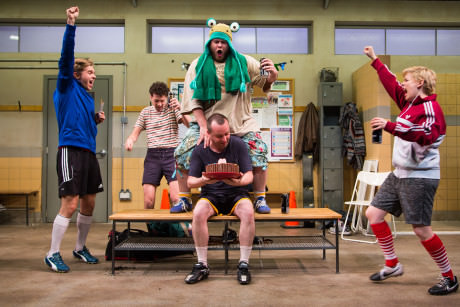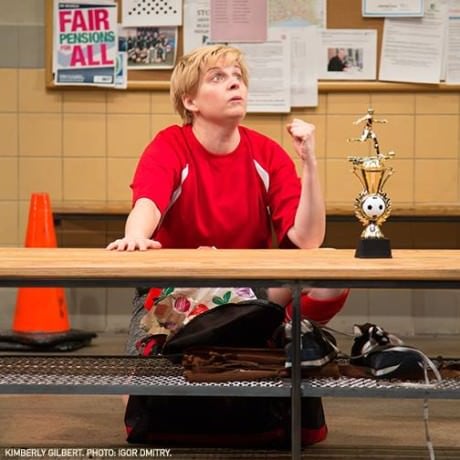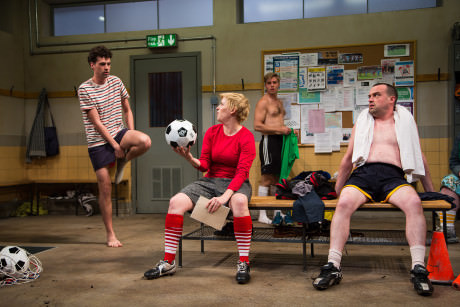The morning after Jumpers for Goalposts opened at Studio Theatre, I sat down to talk with its very talented playwright, Tom Wells. He had been in town watching the last few weeks of rehearsals, working with Director Matt Torney and Dramaturg Adrien-Alice Hansel “trying out slightly tonal things” and doing “some tiny rewrites to fix some of the jokes that in Hull would be quite funny but didn’t quite land in Washington.”

Jumpers for Goalposts is set in a locker room where a team of five amateur soccer players called Barely Athletic rally between defeats. The play had been a huge hit in England. Reviews of the Studio Theatre production were not yet out (accolades were to come from The Washington Post, DC Theatre Scene, and TheaterMania). But just before I met up with Tom at Studio I had filed my rave on DCMetroTheaterArts. (You can read more reviews in ‘Other Reviews‘ on DCMTA).

I called Jumpers for Goalposts “a sweet, side-splittingly funny, and subversive romantic comedy…that will knock your sweat socks off.” I praised the playwright’s “wholly original angle of vision that, besides being laugh-out-loud hilarious, is heartwarming and liberating.” And I was struck by how the play touched on issues around masculinity: “Tom Wells has written a play that lets us in on a level of vulnerability and longing beneath masculine social posturing that is rarely seen as such in life, and he has brilliantly made it visible on stage.”

In person Tom is just as sweet-tempered as his play. Shy, soft-spoken, and humble, he typically starts a sentence several ways before settling on how he wants to complete it, and many he starts but doesn’t. I found him to be exactly the sensitive and careful writer whose words I heard on stage the night before.
John: What has it been like to see your play come to America?
Tom: It’s been really lovely.
Would you talk about the time you’ve spent watching rehearsals?
I think comedy is quite a broad church. There are a lot of different kinds. Trying to find the way that is funny and comic but also feels truthful to these characters was what the last bit of rehearsal was about. Matt did quite a lot of work to make you feel involved. Because it is just a small play—it’s very little—it works when you can see those delicate things. And in that space, I don’t think you can tell lies. You get found out pretty quickly. So the actors have all done pretty detailed character studies. That’s what I’m really proud of.
You know this play so well. You’ve lived with it for a couple of years. Was there anything surprising in the interpretation that the actors or the director brought to this Studio Theatre production?
A couple of my plays have been produced a couple of times, but I’m not used to there being a second production yet. So what is surprising is that it just is a different play, but like it’s still got everything that I really admire about it. In order to play those characters, the actors have to meet those characters halfway. The script doesn’t have a lot of instructions towards character. A lot of it has to do with the rhythm and the way that they’re speaking and sentences that aren’t finished and things. And so what was really heartening for me was seeing five actors kind of meet it in the middle.
I think they have to put quite a lot of themselves into it. It’s about quite small emotional goals really. Like there’s nothing epic about it. So the only way to do that honestly is to sort of bring a bit of your own character into it. It feels like a world peopled with quite loveable people. The best thing about it is, it’s got a slightly different spirit but it’s still the same play. So you see what it is in its bones but you also see a group of people bringing a lot of themselves.
I would like to ask you about Viv, the one woman on the team. Where did that character come from? How did you find her?
When I was writing the play, Viv was a bit of a surprise. Originally it was five men, and I couldn’t quite find a way in. So I just sat down and started writing. And Viv just kind of spoke. And from that moment she’s been a bit of an engine.

She stands for something, in my experience, which is the friendship between gay men and lesbians and that really strong bond. I feel like that’s often—not ignored but like not observed. I used to work in a pub and there was a landlady who sort of held it together. And she told me I was sweeping wrong once, which in a funny way crept into the play. Viv just came and was there. She was great fun to write, because she tells it how it is. And I’m not like that.
You went to the opposite: She’s outgoing, she’s a leader, she’s assertive—
She’s what that group needs. And there’s so much affection for her. Well, I feel affection for her; the other characters do as well. But also she’s really struggling. Watching someone not acknowledge that they’re suffering—like hold it all together for everyone else— You can’t tell anyone that that’s happening, you just have to be in the performance. Viv does a beautiful job of that.
She’s like a radiator of energy for everyone else and just wants things to go well. And really, all she’s asking of them is to try their best. That’s all she wants them to do. And that is not much to ask of a group of friends, is it?
I think what is nice in the team is that there’s a sense of loyalty and a sense of deep friendship, which is quite hard to write about, ’cause you write about the tremors on the edges of it but you have to feel that underneath it there’s a solid—
I know nothing about the world of association football pickup teams in England. So I couldn’t tell where you were playing with what’s typical and where you were actually just borrowing what’s typical. Would there be a trans team? Would there be a lesbian team? Would there be a team with one woman and four men?
It would be unlikely that a team would mix genders. There definitely are gay teams and lesbian teams. I don’t know about trans teams. Within this amateur context it’s purely recreational, there’s nothing official, and so they do things in quite a ramshackle way, which is authentic. That would be how a pub league did it. Pub leagues do exist, so a group of people who drink together on a Sunday afternoon will go and play football and then finish the evening in the pub. And gay teams exist in Britain. The play is a bit of a sideways look at that world. Like, Barely Athletic are really, really bad players. It’s unlikely that anybody could be quite as disastrous as they are.
Did you ever play in such a league?
I’ve never played in a league, but I’ve played five-a-side football, and I’ve played it with my mates at school. We did it every lunch time at school. It’s just what we did. I went to quite a small school, and literally everyone had to play in order to make a team. We played all the small schools, and it was quite ragtag. So that world is quite familiar.
You’ve referred to your first play, Me, As a Penguin, as a play about disappointment that says it’s okay to be disappointed. And I thought last night how many things you say in that play are okay to be. It’s really a very healing and gentle—
But I feel that’s truthful. I think it’s authentic.
I think there’s a lot of standards. I suppose the best way to talk about it is what I see in all the plays about gay people. There are very high expectations of your social life and your personal life and the level of togetherness that you have.
My experience of being gay has been that everyone’s a bit messy and you’re just friends, and for me that was the thing that made me feel a sense of belonging, the first group of gay and lesbian friends that I had that felt like you were part of this community. It wasn’t really the first relationship I had, although that is in a different way very important. I just think being let into a world and feeling a sense of togetherness is actually a massive strength of the gay community, but it isn’t always realized or there’s a risk that it’s taken for granted and not appreciated.
For me as a writer it’s really interesting to write about people who are trying their best, ’cause I think that’s what most people do most of the time actually. Sometimes people make out that they’re jaded and sort of cynical, but I think truthfully everyone’s trying quite hard.
Also a group of people who are struggling with quite ordinary things—theatrically that’s not seen as a big narrative. I think if what you want to write about is people, truthful character studies, portaits of people, that’s what most people do.
I feel like the majority of my life has not been dealing with huge epic problems but dealing with small things that you kind of worry around and navigate, often unspoken. But to you, inside, they mean a lot, you attach significance to them. So I think that feels—hopefully that feels truthful when people are watching it. It feels like there’s a thing that they can recognize about themselves even if it’s not exactly the same story.
You’ve now read my review of your play.
Yeah, thank you.
And I want to give you a chance to talk back to it.
First of all, thank you, you’re so kind, and I’m really glad that you found that in it. For me, as the writer of it, there’s a vision of this play that’s very simple, that you just watch a group of people do things. But it’s really nice for me that you felt engaged with a lot of quite complicated ideas of masculinity and sexuality. I think in the world those things are a lot more nuanced—complicated is the wrong word—more delicate than the way they’re often portrayed. You know, it was cheeky to set this play in the changing room, and it’s really nice that that mischief is there for you to see it.
I love your word mischief.
When we were in rehearsals, that just kept coming up. The actors are really playful and the director is really good, so they all played five-a-side football together and made a little team. That has been a part of the rehearsal process, and I think that’s an authentic part of people who play on teams is that kind of mischief and banter.
Speaking of the banter, I made a point about what isn’t in your play—the pieces of that world of sports that you didn’t bring into it, because you were doing something, something more beautiful, I think. Was that conscious, that you were not going to have it be a place where guys trash-talk each other and women?
As soon as I put those characters together in a room, it didn’t enter my head to do that, because the point is that it’s a small friendship group. And they do take the mickey out of each other. They gently tease. Like, Joey’s not a very good goalie, and he definitely knows that from the way that other people talk about him.

But in your play that gentle teasing feels affectionate.
My experience of sports and of friendship is like that. The stakes of the sport, their expectations of the sport, are quite low, so they don’t—it’s not like a professional game—they never expected to win.
Would it be fair to say that it’s not in the play because it’s not in you?
Maybe. I don’t know.
It seems so.
I hope not—I hope it’s not in me. The thing I like to do as a writer is to write portraits of characters that I feel affection towards. In order for a play to have a structure, you kind of have to put them through things and see the frayed edges of them. But the characters that I’m interested in don’t have that instinct.
I think often on stage there’s a version of making theater where two people have totally opposite views and lash out at each other. That doesn’t feel like life to me. It’s very rare where I’ll meet someone who’s got a totally oppositive view, and if I did I would probably not vocally—I wouldn’t feel like arguing, I wouldn’t feel like debate. ’Cause I just think you’re really personally invested in your opinions; you’ve not just got them as a sparring—it’s not there to be aggressive; it’s just a really important part of who you are.
I think that version of theater makes some amazing plays, and I’m really glad it exists. But it’s not what I would be interested in. This play plotwise is quite meandering. It’s not like someone comes out with like a severed head and you watch it unfold in a sort of Greek way. It’s not like that. I feel like the point of it is to let you into that room.
You have persuaded me that the reason the play was as it was is the extent to which you are in it.
Oh maybe.
You’re young just starting out. You’re at the very beginning of your career. What have you learned that has become important to you in how you would like your body of work to be?
The people I really admire have a lot of heart. Those characters feel like they’ve got heart. No one ever remembers what happens in plays; they just remember how it made them feel. And I think that is a little thing to remember as a writer. You can’t decide how someone’s going to feel about something, but you know how you feel about those people.
Theater is the only kind of writing that has to be about people, ’cause they’re your media. You use actors; they’re what you’re working with. And so it’s been really lovely, because what I’m interested in is people. I don’t have a lot to say about the world. I’m not well informed about big political things. But being able to tell quite small stories with a lot of detail and to let people into that feels like a real privilege, actually. And that people watch it and kind of lean forward halfway—that’s what’s special about theater. It’s live. It’s there. It’s people.
There’s nothing particularly theatrical about this play. It just starts in a room and ends in a room. There’s no big reveal. But I think what is unique about theater is that you fill it with people, and if you do your job right, and the actors and director do their job right, those people feel real.
When Joan Littlewood first produced A Taste of Honey by Shelagh Delaney, there was a reviewer who said everything you should be aiming for: He said it doesn’t matter if it’s a bit rough around the edges because it’s just full of life, the characters have the smell of life. And I just think if you’ve done something where people feel real and you feel attached to them—
You may not know how brave you are.
You honor me. I’m not a brave man.
You have a bravery that comes from a true heart. It has been such a pleasure meeting you.
Oh, thank you so much for coming, and I’m really glad you enjoyed the play. I think that we’re all really proud of it.
Jumpers for Goalposts plays through June 21, 2015 at Studio Theatre’s Metheny Theatre – 1501 14th Street NW, in Washington, DC. For tickets, call the box office at (202) 332-3300, or purchase them online. Running time is about one hour 50 minutes, with no intermission.





